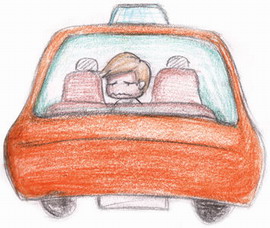 But which way is “home”? With each visit back to the States, it is becoming more and more difficult for my kids to accept the fact that they live in China and won’t be moving back anytime soon. During our first two years here, it wasn’t an issue – we had nice, extended visits back to the US and were able to return, drama-free. It never really occurred to me that this would suddenly shift. But coming back last summer proved tough on them, and our most recent trip last December only served to reinforce their feelings. It is, I suppose, our new paradigm.
But which way is “home”? With each visit back to the States, it is becoming more and more difficult for my kids to accept the fact that they live in China and won’t be moving back anytime soon. During our first two years here, it wasn’t an issue – we had nice, extended visits back to the US and were able to return, drama-free. It never really occurred to me that this would suddenly shift. But coming back last summer proved tough on them, and our most recent trip last December only served to reinforce their feelings. It is, I suppose, our new paradigm.
Last August, it was immediately after my nephew’s bar mitzvah that we left, and with all the families still gathered together, my kids really wanted to stay. For the first time, Jacob cried the night before our departure. His slightly older cousins Sarah and Emma tried to comfort him with reassuring words and encouragement about his present life. It was very sweet.
“It’s so cool you live in China.”
“Only when we go on vacation. The rest of the time it’s just school and homework.”
When this job opportunity in Beijing came up for my wife Rebecca three years ago, we both felt the timing was perfect to make an international move, and it would only get more difficult as our kids got older and approached adolescence. Anna is only 4 and is the least aware of her surroundings, but Jacob is now 10 and a veritable tween. His younger brother Eli follows his lead and, in any case, as our most sensitive soul, has always been the most affected by our move, even though he wasn’t yet 5 when we came to Beijing.
Both boys have complained more about living here since that summer visit. They have become aware of what they’re missing, that life elsewhere doesn’t stop while we’re on our little adventure. We had avoided talk about this upcoming summer, when we won’t go back to the States because of the Olympics, but finally had the discussion with Jacob, who took the news hard.
At least he didn’t write a story called “The Day My Parents Ruined My Life: A Novel,” as 10-year-old Xiaolei McKean did five years ago when her parents told her they were moving back to China (where she was adopted) after two years in Oregon.
“It was written on elementary-school paper – the kind with lines on the bottom and room for a picture on the top,” recalls Xiaolei’s mom, Shelby McKean. “There’s always a point where kids experience moving as a loss and my [three]kids go through it every time they have to say goodbye to their cousins to return to China.”
None of this comes as a surprise to Ruth Van Reken, the co-author of Third Culture Kids, the 1998 book that remains a definitive guide to raising children overseas. The title phrase refers to children who aren’t fully of their parents’ home culture or of the culture of their current home, but rather create a hybrid “third culture,” defined by shared experience rather than the traditional ways of shared ethnicity or nationality.
“It is hard for your kids now,” Von Reken wrote me in an e-mail from her home in Indiana. “The one greatest challenge for TCKs is this incredible paradox of a life filled with so much richness while, at the same time, filled with so much pain of losing places and people we love dearly … But over and over, the TCKs I talk to in their young adulthood and beyond acknowledge the hard parts but wouldn’t trade the richness of their heritage. I expect it will be so for your children.”
If only I knew how to explain that to them.



